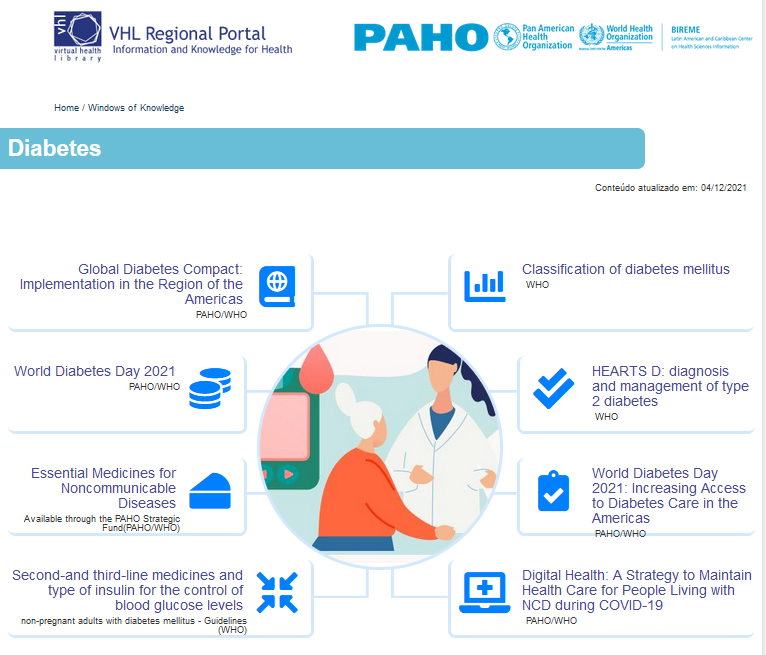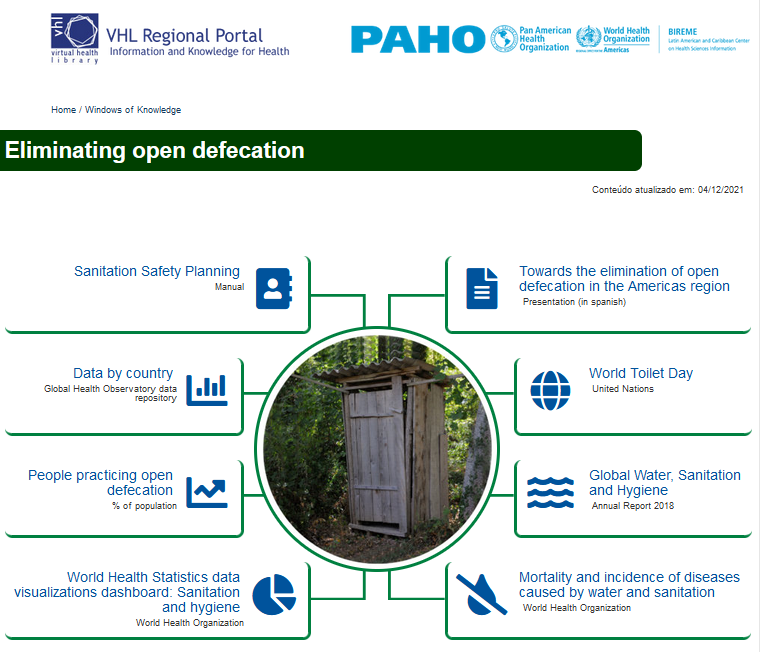Health dates highlighted in the month of November, that integrate the PAHO/WHO calendar, are World Diabetes Day and World Toilet Day. BIREME has developed Windows of Knowledge to support the provision of scientific and technical information, as well as information for the public in infographic and video formats. Learn more about these features.
World Diabetes Day
Every year, when World Diabetes Day is celebrated on November 14th, it is a new opportunity to raise awareness about the impact of diabetes on people’s health and disseminate what can be done to improve prevention, diagnosis, and treatment.
With the theme “Access to diabetes care: if not now, when?” the Pan American Health Organization/World Health Organization (PAHO/WHO) joins its partners to draw the attention of governments and major global players in health care to the need to maintain and improve access to health services and medicines and inputs for the diagnosis, treatment, and self-management of diabetes, which are essential for controlling diabetes, preventing complications, and prolonging and improving the quality of life of those with diabetes. At the same time, the organization aims to provide its partners with their full commitment and their support to join forces in this challenge through the regional implementation of the Global Diabetes Compact.
PAHO / WHO aims to raise awareness in all sectors of society that the disabling complications of diabetes can be prevented with adequate care, but not all people living with diabetes have access to the care that they need.
After nearly 100 years of the discovery of insulin[1], access to diabetes care remains a challenge in many countries. This year, World Diabetes Day is an opportunity to highlight the urgent need to increase access to diabetes diagnosis and treatment to reduce its complications and improve the quality of life of the patients with diabetes. The COVID-19 pandemic continues to generate many challenges in health care, especially in ensuring access to essential services and medicines for people with diabetes in the countries of the Region.
Current situation and available solutions
It is currently within reach of medicine to prevent and treat diabetes, but despite this, the number of people with this disease is rapidly increasing and lack of access to diagnosis and treatment leads to unnecessary suffering and death, especially in low-income populations. More than 420 million people in the world have diabetes.
This number has quadrupled since 1980 and, according to forecasts, will exceed 500 million by the end of this decade. The increase in the prevalence of diabetes is largely a consequence of higher levels of obesity and sedentary lifestyle. Between 1975 and 2016, globally, the prevalence of overweight and obesity between children and adolescents from 5 to 19 years old increased from 4% to more than 18%. Deaths by diabetes in the world increased 70% between 2000 and 2019. Diabetes is one of the main causes of blindness, kidney failure, heart attack, stroke, and lower limb amputation. However, one in two adults with this disease is not aware of this fact, and discovers only when the disease is already in a very advanced stage.
As for type 2 diabetes, half of adults that have diabetes are not diagnosed and those receiving the diagnosis are not guaranteed to access essential and complementary drugs or periodic examination for detection of complications.
 As control measures, it is necessary to develop and strengthen surveillance systems to understand morbidity and mortality by diabetes, the existing gap with regard to the treatment of the disease and the functioning of the health system, in relation to its capacity and the interventions it provides. In addition, promoting healthy eating, regular physical activity, and giving up smoking, and including diagnostic, treatment, and care activities related to diabetes in the primary care system and strengthening the capacity of staff and health institutions to detect and treat diabetes at an early stage.
As control measures, it is necessary to develop and strengthen surveillance systems to understand morbidity and mortality by diabetes, the existing gap with regard to the treatment of the disease and the functioning of the health system, in relation to its capacity and the interventions it provides. In addition, promoting healthy eating, regular physical activity, and giving up smoking, and including diagnostic, treatment, and care activities related to diabetes in the primary care system and strengthening the capacity of staff and health institutions to detect and treat diabetes at an early stage.
Inclusion of insulin in the national list of essential medicines would certainly be an important step, as well as including the treatment of diabetes and blood glucose monitoring in the country’s social security provision.
The Window of Knowledge on Diabetes, developed by BIREME/PAHO/WHO, in addition to highlighting the theme of World Diabetes Day 2021, includes WHO documents, such as the classification of the disease, and PAHO information sources, such as essential medicines for non-transmissible diseases (DNT) available at the Organization’s Strategic Fund of the organization, and medicines and type of insulin for glucose control. It is possible, in addition, to find information for patients, links to online resources recommended by experts, and scientific and technical literature selected from the databases of the Virtual Health Library.
Source: Pan American Health Organization. 2021. World Diabetes Day 14 November 2021. Available at: https://www.paho.org/en/campaigns/world-diabetes-day-2021.
World Toilet Day
On World Toilet Day, observed on November 19, the United Nations seeks to draw attention to a subject that impacts the environment and public health, since nearly half of the world’s population lacks secure sanitation services. When sewage and sanitation services do not exist or do not work properly, the environment in the surroundings are threatened, and with it, the health of the populations that live there.
Estimates calculate that for every US$ 1 employed in basic sanitation, US$ 5 are saved in medical costs and increased productivity, as well as promoting job creation along the service chain. In the case of women and girls, toilets installed in homes, schools, and workplaces contribute to them concentrating on their potential and provide dignity, privacy, and security, especially during menstruation and pregnancy.
Adopting measures in this sense helps respond to the global sanitation crisis and contributes to achieving Goal 6.2 of the Sustainable Development Goals (SDGs), which aims to ensure the availability of water and sanitation for all by 2030, and Goal 3.9 that aims to reduce the number of deaths and diseases caused by hazardous chemicals and air, water, and soil pollution.
 Despite access to sanitation being a human right recognized by the United Nations, estimates calculate that it is necessary to quadruple investments and implement significant innovations to produce advances in the basic sanitation chain. Responsibility is in the hands of governments to allocate specific funds for this purpose and include them in decision-making processes.
Despite access to sanitation being a human right recognized by the United Nations, estimates calculate that it is necessary to quadruple investments and implement significant innovations to produce advances in the basic sanitation chain. Responsibility is in the hands of governments to allocate specific funds for this purpose and include them in decision-making processes.
To support the awareness of this situation and on the appropriate measures, BIREME, in partnership with PAHO/WHO’s Climate Change and Social Determinants of Health (CE/CDE), created the Window of Knowledge on Eliminating Open Defecation, which contains WHO documents, such as the Planificación de la Seguridad del Saneamiento, ETRAS/PAHO/WHO standards, basic sanitation data by country from the Global Health Observatory Data, mortality and incidence of diseases caused by failures in water treatment and sanitation from the WHO, as well as scientific and technical literature in the Virtual Health Library databases. In addition, a detailed situation of the countries of the American continent is available in this aspect, and information in video format and infographics for the general population, selected documents, and links of interest.
Source: United Nations. 2021. World Toilet Day 19 November. Available at: https://www.un.org/en/observances/toilet-day
[1] Frederick G. Banting and John J. R. Macleod received the Nobel of Physiology or Medicine for the discovery of insulin in 1923. The Nobel Prize in Physiology or Medicine 1923. NobelPrize.org. https://www.nobelprize.org/prizes/medicine/1923/summary/